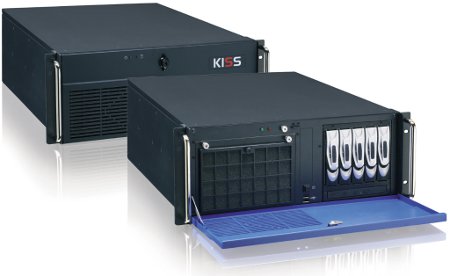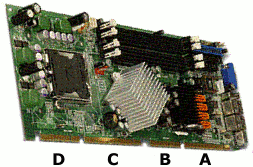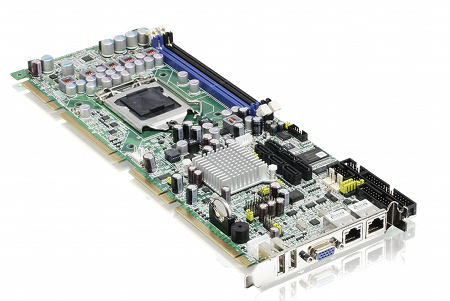Server uses PICMG SBC, delivers twelve expansion slots
Jul 29, 2011 — by LinuxDevices Staff — from the LinuxDevices Archive — viewsKontron added to its range of rackmount Kontron Industrial Silent Server (KISS) devices with a model offering a PICMG 1.3 backplane and system host board. The KISS 4U PCI761 supports Intel Core i3, i5, and i7 processors running at up to 3.06GHz, up to 8GB of DDR3 RAM, five external drive bays and one internal bay, and up to 12 expansion slots, according to the company.
Kontron has already released multiple KISS 4U servers, including:
- the KISS 4U KTC5520, released in June 2010 and then respun for railway use last April as the KISS 4U KTC-5520 Transportation Server
- the KISS 4U Q57, released last October
- the KISS 4U KTQ45, released in October 2009.
All these devices employed previously released ATX-format motherboards from Kontron. The KISS 4U PCI761 instead houses its core computing capabilities on a PICMG (PCI Industrial Manufacturers Group) SBC (single board computer), which is attached to a passive backplane. This allows the server to provide an impressive total of twelve expansion slots.
The SBC in question is the PCI-761, analyzed later in this story. As we'll detail, this board determines the amount of memory and processor choices for the KISS 4U PCI761, and it also offers plenty of I/O (via both coastline ports and headers).
Kontron says KISS 4U PCI761 customers can choose either of two backplane configurations. One provides seven full-size PCI slots, four PCI Express x1 slots, and one PCI Express x16 slot; the other provides three full-size PCI slots, four PCI Express x1 slots, four PCI Express x4 slots, and one PCI Express x16 slot.

Kontron KISS 4U PCI761
(Click to enlarge)
Meanwhile, the KISS 4U PCI761's case (above) is quite similar to those of the previous KISS 4U devices we've mentioned. That means it offers multiple, hot-swappable cooling fans, a front panel that's sealed to IP20 standards (IP52 optional), and a choice of 400 Watt, 650 Watt, or redundant 500 Watt power supplies.
According to Kontron, the case provides three externally accessible bays for 5.25-inch disk drives, one external bay for 3.5-inch drives, and a bay for optical drives using the company's own slim format. An internal bay provides a further 3.5-inch bay, the company adds.
Kontron says the KISS 4U PCI761 has two front-panel USB ports. It adds that the installed SBC has two gigabit Ethernet interfaces, two USB 2.0 ports, and a VGA port on its coastline — but let's get into that further with a more detailed discussion of the PCI-761.
Kontron's PCI-761
Kontron's PCI-761, measuring 13.3 x 4.8 inches, follows the PICMG 1.3 standard, which adapts PCI and PCI Express to passive backplane implementations. Generally found in telecom, industrial automation, military, and medical applications, PICMG 1.3 defines four backplane connectors, labeled A through D in the photo below.

PICMG 1.3 backplane connectors
From right to left, they're:
- A — 164 pins — PCI Express up to 16 lanes
- B — 98 pins — PCI Express up to 8 lanes
- C — 164 pins — SATA, USB, IPMB, SMBUS, geographic addressing, power management
- D — 98 pins (optional) — PCI or PCI-X parallel bus
As the photo below suggests, Kontron's PCI-761 uses all four of these connectors. The device's expansion interfaces include one PCI Express x 16 graphics port (also supporting SDVO or PCI Express x1 devices), a PCI Express x4 interface (also supporting four PCI Express x1 devices), and four 32-bit PCI bus masters, according to the company.

Kontron's PCI-761
(Click to enlarge)
Kontron says two SATA ports and four USB 2.0 ports are also routed over the backplane. Meanwhile, onboard expansion includes eight further USB 2.0 ports and four more SATA ports (with RAID functionality), the company adds.
According to Kontron, onboard connectors also serve up: two serial ports (RS232 and RS232/422/4485); an LPT port; a floppy disk interface; and a SMbus interface. The SBC's mounting bracket, meanwhile, provides access to two more USB 2.0 ports, a VGA port, and two gigabit Ethernet ports.
Employing Intel's Q57 Express chipset and an LGA1156 processor socket, the PCI-761 is said to accept Pentium processors or Core i3/i5/i7 CPUs, topping out with a 3.06GHz version with quad cores. Fixed storage may be added to the SBC via a "robust," USB-interfaced flash module, says Kontron.
According to Kontron, the PCI-761 includes a TPM (trusted platform module) and supports Intel's AMT (active management technology). The SBC — and, hence, the built-up KISS 4U PCI761 — supports Windows Embedded Standard 7 as well as other Windows versions and Linux, the company adds.
Features and specifications provided by Kontron for the KISS 4U PCI761 include:
- Processor — LGA1156 socket supports Pentium or Core i3/15/i7 at up to 3.06GHz
- Chipset — Q57 Express
- Memory — up to 8GB of DDR3 RAM via two DIMM slots
- Storage:
- external — 3 x 5.25-inch bays, 1 x 3.5-inch, 1 optical bay
- internal — 1 x 3.5-inch
- Expansion, via choice of backplanes:
- 7 x PCI, 4 x PCI Express x1, 1 x PCI Express x16 or
- 3 x PCI, 4 x PCI Express x1, 4 x PCI Express x4, 1 x PCI Express x16
- Networking — 2 x gigabit Ethernet
- Other I/O:
- Real-world ports on mounting bracket:
- 1 x VGA
- 2 x USB 2.0
- Onboard via headers or connectors:
- 4 x SATA
- 2 x PS/2
- 1 x LPT
- 1 x RS232/422/485 and 1 x RS232
- 8 x USB 2.0 (2 routed to front panel)
- Real-world ports on mounting bracket:
- Power — 100~240 VAC 400W; optional 650W or redundant 500W
- Operating range — 32 to 122 deg. F (0 to 50 deg. C)
- Dimensions — 19 x 18.5 x 7 inches (482 x 472 x 177mm)
- Weight — approximately 33 pounds (15kg)
Further information
Pricing was not stated, but the KISS 4U PCI761 is available now, according to Kontron. Further information may be found on the KISS 4U PCI761 product page.
Jonathan Angel can be reached at [email protected] and followed at www.twitter.com/gadgetsense.
This article was originally published on LinuxDevices.com and has been donated to the open source community by QuinStreet Inc. Please visit LinuxToday.com for up-to-date news and articles about Linux and open source.